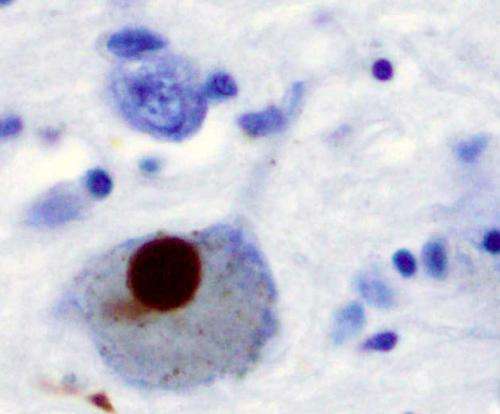Formation of new blood vessels may explain intractable symptoms of Parkinson's disease

Unwanted formation of blood vessels (angiogenesis) in the brain is likely to be the cause of intractable walking and balance difficulties for people who suffer from Parkinson's disease. This conclusion is supported by new research from Lund University in Sweden.
Many people with Parkinson's disease eventually experience walking and balance difficulties, despite adequate medication. Moreover, some patients cannot fully take dopamine-based medication, as dopamine can lead to side effects.
The current research findings verify similar data from a previous study by other researchers, which was performed on brain tissue from a small number of deceased patients.
"The strength of our study is the number of participants, and the fact that they are alive. Because many suffer from several parallel diseases at the final stage of their lives, it is difficult to analyse samples from deceased persons", explains Oskar Hansson, reader at Lund University and consultant at Skåne University Hospital.
The findings, published in the journal Neurology, were made when the researchers used a broad approach when looking for mechanisms to increase understanding of how Parkinson's disease works."The measurements showed clear connections between markers of angiogenesis in the brain and walking or balance difficulties among the participants. We also noted an increased permeability of the blood-brain barrier, which leads to blood components potentially leaking into the brain and causing damage", says Oskar Hansson.The first part of the study included 100 Parkinson's patients and 38 healthy control persons at Skåne University Hospital in Malmö. Through a cerebrospinal fluid sample, several different proteins that indicate formation of blood vessels in the brain were measured. To ensure the results, two additional groups of patients of approximately the same size were also tested.
"Medication for angiogenesis already exists. If we can confirm our results in further studies, these drugs can be tested on Parkinson's patients in the future", says Oskar Hansson.
Before it may be time to test the drugs in clinical studies, Oskar Hansson and his colleagues plan on conducting an animal study, to gain further knowledge about the mechanisms that are believed to cause problems for Parkinson's patients, and to enable a selection of the most appropriate drugs to use.
More information: S. Janelidze et al. Increased CSF biomarkers of angiogenesis in Parkinson disease, Neurology (2015). DOI: 10.1212/WNL.0000000000002151

















